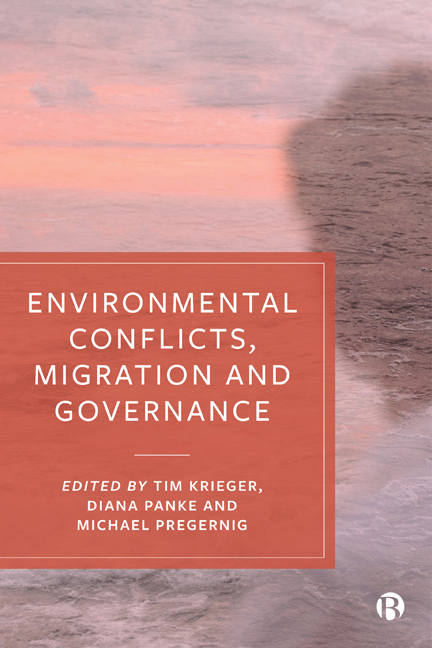Book contents
- Frontmatter
- Contents
- List of Figures and Tables
- List of Acronyms
- Notes on Contributors
- Acknowledgements
- 1 Environmental and Resource-Related Conflicts, Migration and Governance
- 2 Renewable Resource Scarcity, Conflicts and Migration
- 3 Extractive Resources, Conflicts and Migration
- 4 Climate Change, Conflicts and Migration
- 5 The Individual Level: Selection Effects
- 6 The Individual Level: Sorting Effects
- 7 Migration Governance at the State Level: Policy Developments and Effects
- 8 Environmental Migration Governance at the Regional Level
- 9 Migration Governance at the Global Level: Intergovernmental Organizations and Environmental Change-Induced Migration
- 10 The Link between Forced Migration and Conflict
- 11 Conflict-Prone Minerals, Forced Migration and Norm Dynamics in the Kimberley Process and ICGLR
- 12 On the Nexus Between Environmental Conflict, Migration and Governance: Concluding Remarks
- Index
4 - Climate Change, Conflicts and Migration
- Frontmatter
- Contents
- List of Figures and Tables
- List of Acronyms
- Notes on Contributors
- Acknowledgements
- 1 Environmental and Resource-Related Conflicts, Migration and Governance
- 2 Renewable Resource Scarcity, Conflicts and Migration
- 3 Extractive Resources, Conflicts and Migration
- 4 Climate Change, Conflicts and Migration
- 5 The Individual Level: Selection Effects
- 6 The Individual Level: Sorting Effects
- 7 Migration Governance at the State Level: Policy Developments and Effects
- 8 Environmental Migration Governance at the Regional Level
- 9 Migration Governance at the Global Level: Intergovernmental Organizations and Environmental Change-Induced Migration
- 10 The Link between Forced Migration and Conflict
- 11 Conflict-Prone Minerals, Forced Migration and Norm Dynamics in the Kimberley Process and ICGLR
- 12 On the Nexus Between Environmental Conflict, Migration and Governance: Concluding Remarks
- Index
Summary
Introduction
Developing countries are among the most vulnerable to climate change and seasonal inter-annual climate variability. Societies living in violence and conflict-affected areas are particularly vulnerable to the physical impacts of climate change – although the magnitude and intensity of these impacts vary across geographical and climatological region (Adger et al, 2014). According to the Food and Agriculture Organization (FAO) (2017), droughts have affected about 363 million people in Sub-Saharan Africa over the past 20 years – 203 million of these in East Africa alone.
In spite of manifold discussions in academic literature, there has yet not been full consent on the role of climate change on security issues, political fragility and armed conflict (for example, Buhaug, 2016; Abel et al, 2019). This chapter hypothesizes that climate change effects on dry extremes at the local level help sustain prolonged armed conflicts and disrupt traditional migration patterns. Climate and conflict-related population movements in the presence of renewable resource scarcity are highly interconnected and undifferentiated (see Chapter 2). The chapter addresses the multifaceted legitimacy of the climate conflict discourse with respect to political fragility, climatic variability, and the social dimension. By doing so, it investigates different drivers of conflict and fragility over time. It then analyzes the relation of changing actors in conflict, environmental disruptions and mixed migration. The chapter adopts a political economy perspective in an embedded case study to investigate, first, conflicts and second, migration in the context of climate change. It discusses how main actors’ interests and power relations are linked to the ongoing conflict in Somalia. The conclusion asks for streamlined, flexible governance measures to address climate conflicts.
Study context
Located in East Africa, Somalia is the fifth poorest country in the world. In 2016, 51% of the population lived on less than US$1.9 a day at 2011 purchasing power parity, according to World Bank data (2017). Exports constitute only 14 per cent of the gross domestic product (GDP); livestock trading with the Gulf of Aden presents the mainstay of the Somali economy, constituting 80 per cent of foreign exchange earnings. With over 65 per cent of rural people dependent on traditionally mobile agricultural and pastoralist livelihood strategies, its population is vulnerable to droughts, residual flooding and the loss of pastureland.
- Type
- Chapter
- Information
- Environmental Conflicts, Migration and Governance , pp. 59 - 82Publisher: Bristol University PressPrint publication year: 2020



